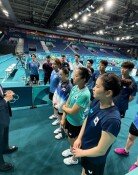Wharton School Official Visits Korea
John Spector, vice dean of the Wharton School visited Korea on March 21.
He came to attend an entrance ceremony of the Wharton-KMA CEO Institute for Korean business people, established by the Korean Management Association.
The Wharton School, with its 125 year-old history, has a reputation of having a world-class MBA program, along with Harvard Business School.
It is rather humbling to hear the school say it came to Korea to learn from Korean companies.
Actually, Wharton doesnt know very much about Asian countries, including Korea. For example, there are few companies that attempt to compete with Microsoft. But, in Korea, Haansoft is competing with MS. Its very interesting. If I just stay in Pennsylvania, how can I study such an interesting case?
The entrance ceremony was attended by leading Korean CEOs, such as Kang Young-jung of the Daekyo Group, Lee Seung-han of Samsung Tesco Homeplus, and Hwang Du-yul of the Korea National Oil Corporation.
The tuition fee for a four-month course is 29 million won, the equivalent of one-years worth of school fees for typical masters and doctoral programs in the U.S. Nonetheless, the competition rate for entrance is four to one, implying that it is more competitive than taking a university entrance exam.
When asked what they can learn from Wharton School, Spector instead asked the following seven questions.
What is our goal? What tools are needed to achieve the goal? In what ways should strategies be implemented? Where can we find top-notch talents? How can we proceed with negotiations? What is our competitiveness? What kind of danger factors do we have?
I learned from experience in business consulting that many corporations couldnt answer even the first question.
Vice Dean Spector graduated from Harvard Business School and had been consulting IT and communication businesses for McKinsey, a management consulting firm, for 20 years.
If you try to learn all of the seven questions, you will gain nothing. CEOs are very busy. So, if you find out a couple of solutions needed for your company, it is a success.
Wharton School courses are so difficult that they are sometimes referred to as a Hell Race. About 80,000 alumni feel all the more proud of their school because they passed such a difficult entrance process.
There is a Wharton alumni association, which includes 400 people such as Ahn Yong-chan (president of Aekyung) and Kim Shin-bae (president of SK Telecom). If they finish the four-month course successfully, 54 businessmen who received admission offers this time, will be added to the alumni list.
Spector was asked how he feels about criticism that Wharton, one of the most prestigious programs, focuses too much on studying and consequently, fails to produce talents with business ability. Added to the question was citing of research that Ivy League MBA school graduates make up only 10 percent among the worlds top 100 companies,
Spector looked perplexed for a moment and said, Thats an interesting analysis. We should accept criticism. However, the current curriculum is much more difficult to study than 25 years ago when I went to an Ivy League business school. We always consider whether our program is suitable in producing business leaders. Who would come to where there is nothing to learn.
Wharton School has been strengthening its marketing in Asia by opening an office in Shanghai, China last year. Spector said that he imagines that Wharton could open an office in Korea within two or three years if an academic exchange with Korea is expanded.
He further stated that this is because some Korean firms have become a member of the Big League in the world market.
Spector also didnt forget to advise Korean companies and government that Korean companies need to find out in which area their competitiveness lies just as India has found their competitiveness in the software industry, China in low-wage labor forces and the U.S. in the development of new products and new technology.
He went on to say that regarding the government, Trade barriers and regulations should be lifted. Not all the regulations should be resolved, but many research outcomes have proved that less regulation generally helps an economy develop.
Jae-Dong Yu jarrett@donga.com







